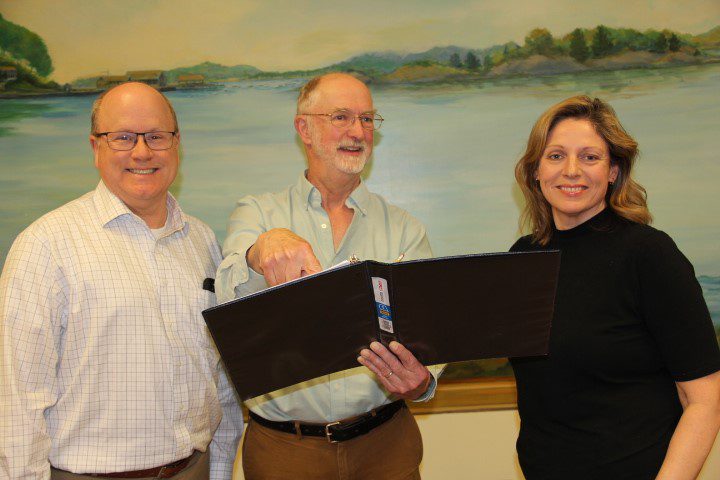
April 21, 2022 By Carol Britton Meyer
The Hingham Singers will perform the concert version of "Weetamoo and the King" -- an original musical created by longtime Hingham resident Paul Kenwood Cappers -- on May 7, combining entertainment with actual history through a variety of musical styles.
Set in the early 17th century in what was to become southeastern Massachusetts and Rhode Island, "Weetamoo and the King" tells the story of the Pokanoket Nation, the Indigenous People of the area, Cappers -who served as choral director and Music Department chair for the Hingham Public Schools for many years before retiring 15 years ago -- told the Hingham Anchor.
The premiere performance will take place at 4 p.m. at Hingham Congregational Church, 378 Main St.
This concert version of the musical features many of the original songs from the complete show, with narration explaining the plot substituting for the dialogue. Hingham Select Board Chair Joseph Fisher will be the narrator while Cappers conducts.
In addition to The Hingham Singers, the Wompatuck Senior Orchestra -- which rehearses weekly in Hingham -- will perform several favorite orchestral works to round out the program.
"'Weetamoo and the King' is the story of the original racism and White supremacy on our shores, tracing the story of the Indigenous Pokanoket Nation of Massasoit, King Philip, and Weetamoo and their conflicts with the Colonial Settlers in Massachusetts and Rhode Island from pre-contact 1600 to 1676. It also reveals the leadership role of Sachem Weetamoo in King Philip's War of 1675-1676," Cappers told the Hingham Anchor. "By the end of the war between the Colonists and the Indigenous People, through diseases introduced by the Europeans and deaths during the war, the original population of 8,000 Indigenous at the start of the century was reduced to 400, representing a loss of 7,600 people in 76 years."
Weetamoo was an important female sachem and military general of the Pokanoket group, and Philip, a.k.a. "Metacom," became the leader of the rebellion against the English settlers.
The colonists gave him the moniker of "King Philip," and the rebellion became known in history as King Philip's War.
"Many sources state that this war killed more people in this area, per capita of their contemporary population, than any other war in United States history," Cappers explained.
He noted that even a cursory look around New England will find the names of the Pokanoket people in many places: King Philip High School in Wrentham; King Philip Middle School in Norton; Massasoit Junior College in Brockton (Ousamequin/Massasoit was the father of Philip); Metacomet Elementary School in Bloomfield, Connecticut; and Weetamoo Woods in Tiverton, Rhode Island.
During his extensive research while creating the musical, Cappers found the historical record left by Indigenous, Pilgrim, and English sources "to be remarkably aligned. The musical is based upon these facts, and it tells the intriguing story of the interaction of these two cultures during this 76-year period of our history," he said.
The second part of the program will feature the Wompatuck Senior Orchestra, also conducted by Cappers, playing the closing chorale from J.S. Bach’s cantata, Ein Feste Burg, the Overture to the Royal Fireworks by G.F. Handel, Mozart’s Marriage of Figaro Overture, and a medley from Leonard Bernstein’s "West Side Story."
The musical, which was written over a number of years, was inspired by a young man of Indigenous lineage who Cappers met while teaching music in the Boston Public Schools in 1972. "He was living in his car at the time and told me that he hoped someday someone would wright about the sufferings of his people," Cappers recalled. "What he said stayed with me for many years."
Cappers also found inspiration from reading the book "King Philip's War," by Michael Tougias, a Massachusetts resident -- whom Cappers talked with a number of times and who read his script -- and Ryan Brown, a Pokanoket who is a direct descendant of King Philip and Massasoit, who also provided invaluable assistance, according to Cappers.
"The biggest thing is that history tells the wrong story. What we learned growing up was inaccurate in terms of the interaction between the Indigenous and Colonial people. The Colonists didn't think of, or treat, the Indigenous People as equals," Cappers said. "Just to set the record straight, this land is their land, and I hope people who attend the concert will begin to understand history in a fairer light."
There is no admission charge. A free-will offering for anyone who wishes to contribute will benefit the Pokanoket Tribe to which Weetamoo and King Philip belonged.

